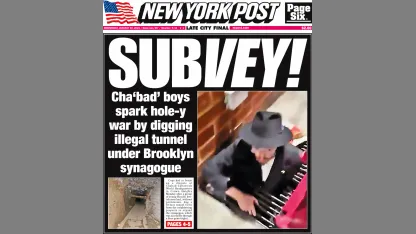Hasidic Jewish students charged in NYC synagogue tunnel digging scoff at plea offer: ‘Rather go to prison’
The Hasidic Jewish students who dug a secret tunnel under a Brooklyn synagogue said they’d rather go to prison than face a ban from the historic temple — as they rebuffed plea deals from prosecutors Thursday.
Nearly all of the 13 young men charged over the infamous hideout — which went viral when it was discovered in January — scoffed at the offer from the Brooklyn District Attorney’s Office that would see them barred from the historic Crown Heights temple for three years.
“Being banned from 770 [Eastern Parkway] for three years is worse than jail,” one of the defendants, Yaakov Rothchild, told The Post in Hebrew through a translator, referring to the headquarters of the Chabad-Lubavitch movement.
Rothchild could face up to seven years behind bars on felony charges of second-degree criminal mischief if he takes his chances at trial.
He and 12 of his co-defendants — who face obstruction of justice charges — could be headed to trial in January if they fail to come to an agreement with prosecutors.
Rothchild’s attorney, Jonathan Fink, called the suggestion of a Jan. 13, 2025 trial “silly,” noting the magnitude of the cases, which charges the renegades — including rabbinical students — of hiding inside a hole in a wall they’d damaged and refusing to get out despite police orders, according to court documents.
Fink also shot down the deal on the table, saying it had “no chance” of being accepted, during a hearing in Brooklyn Supreme Court Thursday.
The agreement would have most defendants pleading down to fourth-degree criminal mischief, a misdemeanor, in exchange for no jail time. They would instead face a three year ban from the house of worship and either 20 days of community service or $5,000 in restitution.
Assistant District Attorney Frank Longobardi argued the ban was necessary, noting the defendants were caught posing with a sign that said “Expand 770” — a reference to the tunnel-digging at the synagogue — at their arraignments in April.
“It’s our concern, for that reason, that they’ve shown that they’re not going to stop doing that,” Longobardi said. “When this case is over, they’re going to do the same thing.”
Judge Adam Perlmutter acknowledged that both sides were at a stalemate, and wondered if the terms of the restraining order sought by prosecutors could be tailored to allow the students access to the synagogue.
But if any more tunnel-digging occurred, the defendants would be charged with criminal contempt and face jail, the judge warned.
“[If] somebody does so much as lifts a toothpick towards demolishing cement or whatever in that facility, that individual could very well face a year on Rikers, a year of incarceration,” Perlmutter said.
Only one defendant — Menachem Molekandov, who lives in Israel — is considering taking the prosecution’s deal, according to his attorney Levi Huebner.
Molekandov appeared virtually to plead guilty but there was a holdup on what type of community work he would do since the judge wants it to be “meaningful” service done outside of religious organizations.
When the judge reminded him that he must remain away from the synagogue, Molekandov, who has a warrant out for his arrest, reassured him that he wouldn’t go back.
“Your honor, I just want you to know — since I’m unable to go to the United States, there’s no way for me to dig any tunnels,” Molekandov said.
Chabad-Lubavitch, referred to as 770, is considered one of most sacred buildings in the Big Apple.
Sources have said that the group of rebels used shovels to dig a secret excavation under the house or worship beginning during the pandemic because higher-ups were slow to expand the synagogue’s sanctuary.
They first gained entry into a deserted Jewish man’s ritual bath on Kingston Avenue and then busted through a 2-by-2-foot metal gate in the former bath’s basement before digging their way under a sanctuary space used by women next door to the synagogue.
The wannabe miners also attempted to stop cement-truck workers from filling their excavation sites earlier this year in an effort to protect it when cops were called. Prosecutors said Thursday that the cement had since been filled.
The melee outside of the synagogue, that broke out when the students allegedly refused police orders to scram, was caught on video and quickly went viral.
The synagogue is a popular place for students to study the teaching of Rabbi Menachem Mendel Schneerson, aka the “Rebbe,” who called on expanding the building before his death in 1994.
For Yerachmiel Blumenfeld, another defendant in the case, the synagogue is the “House of Rebbe” that isn’t just any regular temple.
“It’s a very important place where we learn, pray and connect with our leader. This is a very meaningful thing for us,” Blumenfeld said. “This particular synagogue has a bigger meaning to us than going to another synagogue.”




![ANYONE HEARD ABOUT THIS❓[ANNAWICKFKAEPSTEIN'S DEAD WOMAN'S SWITCH]](https://vidgambit.com/wp-content/uploads/2025/05/ANYONE-HEARD-ABOUT-THIS❓ANNAWICKFKAEPSTEINS-DEAD-WOMANS-SWITCH-310x200.jpg)